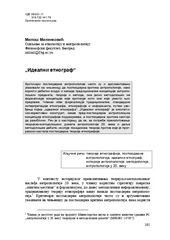Приказ основних података о документу
'Idealni etnograf'
'The ideal ethnographer'
| dc.creator | Milenković, Miloš | |
| dc.date.accessioned | 2021-10-12T10:38:18Z | |
| dc.date.available | 2021-10-12T10:38:18Z | |
| dc.date.issued | 2006 | |
| dc.identifier.issn | 0350-0861 | |
| dc.identifier.uri | http://reff.f.bg.ac.rs/handle/123456789/569 | |
| dc.description.abstract | Kritičari postmoderne antropologije često su i argumentovano ukazivali na činjenicu da postmoderna kritika antropologije, iako koristi debatni modus i napada tradicionalne koncepcije antropoloških predmeta, teorija i metoda, ona jasno metodološki ne formalizuje koncepcije koje kritikuje niti one koje umesto njih predlaže. Članak ipak formalizuje tradicionalne, standardne interpretacije etnografa, etnografije i informanta, putem uvođenja pojma "idealnog etnografa". "Idealni etnograf" je hipotetičko-korektivni konstrukt kakav pred-postmoderna antropološka koncepcija etnografije podrazumeva, a postmoderna kritika nastoji da razobliči. Reč je o nastojanju da se, za potrebe preispitivanja teorijsko-metodoloških dometa antropologije 20. veka i dalje metodološke debate, izoluje pozadinska teorija protiv koje je programski nastala postmoderna teorija etnografije. | sr |
| dc.description.abstract | This article is conceived within the scientific project "Anthropology in the 20th Century: Theoretical and Methodological Achievements". Focusing on the the disciplinary debates and critique around Millennium, this first article in a series offers a preliminary redefinition of some of the basic anthropological concepts: ethnography, ethnographer and informant, as used in pre-postmodern theory of ethnography. Critics interpreted postmodern anthropology as a strong form of relativism that is both epistemologically self-refuting and socially irresponsible. Much credit for the resulting turmoil goes to "postmodernists" themselves, as they failed to articulate precisely in what way their project rejects the traditional concept of regulative methodology, and what their reinterpretation of relativist conceptions of truth, authority, reflexivity, objectivity, interpretation and representation is. The critics dwelled heavily on the notion of incompleteness, vagueness and methodological irrelevance of postmodern criticism in anthropology, largely due to the fact that it never put forward clear definitions of the basic concepts it aims to pursue or to relinquish. As opposed to this received view, the article argues that at least one of the basic concepts used by postmodernists can be methodologically formalized: it is that of "traditional" or the "realist ethnographer". By construing hypothetical "ideal ethnographer", the article formalizes background theory of ethnography against which the postmodern project raised. | en |
| dc.publisher | Srpska akademija nauka i umetnosti SANU - Etnografski institut, Beograd | |
| dc.relation | info:eu-repo/grantAgreement/MESTD/MPN2006-2010/147037/RS// | |
| dc.rights | openAccess | |
| dc.rights.uri | https://creativecommons.org/licenses/by-nc-nd/4.0/ | |
| dc.source | Glasnik Etnografskog instituta SANU | |
| dc.subject | teorija etnografije | sr |
| dc.subject | postmoderna antropologija | sr |
| dc.subject | metodologija | sr |
| dc.subject | istorija antropologije | sr |
| dc.subject | idealni etnograf | sr |
| dc.subject | antropologija u 20. veku | sr |
| dc.subject | twentieth century anthropology | en |
| dc.subject | theory of ethnography | en |
| dc.subject | 'the ideal ethnographer' | en |
| dc.subject | postmodern anthropology | en |
| dc.subject | methodology | en |
| dc.subject | history of anthropology | en |
| dc.title | 'Idealni etnograf' | sr |
| dc.title | 'The ideal ethnographer' | en |
| dc.type | article | |
| dc.rights.license | BY-NC-ND | |
| dc.citation.epage | 172 | |
| dc.citation.issue | 54 | |
| dc.citation.other | (54): 161-172 | |
| dc.citation.spage | 161 | |
| dc.identifier.fulltext | http://reff.f.bg.ac.rs/bitstream/id/2099/566.pdf | |
| dc.identifier.rcub | https://hdl.handle.net/21.15107/rcub_reff_569 | |
| dc.type.version | publishedVersion |

